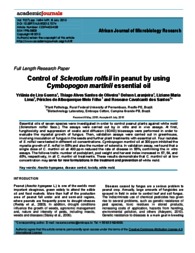Control of Sclerotium rolfsii in peanut by using Cymbopogon martinii essential oil.
Control of Sclerotium rolfsii in peanut by using Cymbopogon martinii essential oil.
Author(s): GUERRA, Y. DE L.; OLIVEIRA, T. A. S. DE; LARANJEIRA, D.; LIMA, L. M. de; MELO FILHO, P. DE A.; SANTOS, R. C. dos
Summary: Essential oils of seven species were investigated in order to control peanut plants against white mold (Sclerotium rolfsii Sacc.). The assays were carried out by in vitro and in vivo assays. At first, fungitoxicity and suppression of oxalic acid diffusion (SOAD) bioassays were performed in order to evaluate the mycelial growth of fungus. Then, validation assays were carried out in greenhouse, involving inoculation of fungus in the seeds and further plant treatments with essential oil. Four isolates of S. rolfsii were tested in different oil concentrations. Cymbopogon martinii oil at 300 ppm inhibited the mycelia growth of S. rolfsii in 55% and also the number of sclerotia. In validation assay, we found that a single dose of C. martinii oil at 400 ppm reduced the rate of disease in 55%, confirming the in vitro assays. The follows traits: number of pods/plant, pod weight and harvest index increased in 57, 54, and 40%, respectively, in all C. martini oil treatments. These results demonstrate that C. martinii oil at low concentration may serve for new formulations in the treatment and prevention of white mold.
Publication year: 2015
Types of publication: Journal article
Unit: Embrapa Cotton
Observation
Some of Embrapa's publications are published as ePub files. To read them, use or download one of the following free software options to your computer or mobile device. Android: Google Play Books; IOS: iBooks; Windows and Linux: Calibre.
Access other publications
Access the Agricultural Research Database (BDPA) to consult Embrapa's full library collection and records.
Visit Embrapa Bookstore to purchase books and other publications sold by Embrapa.

